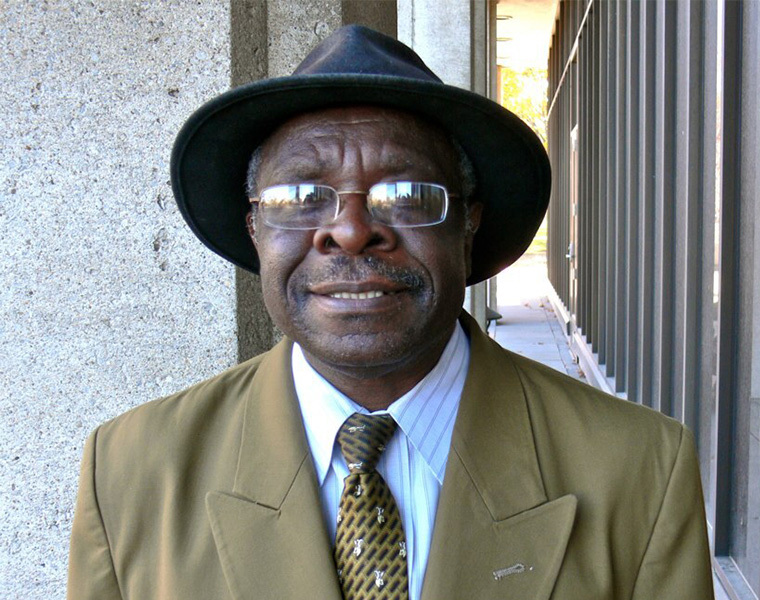Whether through his scholarly work or his interactions with colleagues and students, Gilbert Doho’s concern for others was evident throughout his 20 years at Case Western Reserve.
“Gilbert Doho was formed of passion and decisiveness, yes,” said colleague Denise Caterinacci, senior instructor of Italian. “But deeper in him was a drive to advance justice and respect for humanity that is only found by releasing the purity of truth. Gilbert lived with purposeful confidence in what he believed. … This was evident in the work he yielded.”
Now, the Case Western Reserve University community is mourning the loss of Doho, who died Dec. 20 of cancer.
In his time at CWRU, Doho, an associate professor of French and section head in the Department of Modern Languages and Literatures at the College of Arts and Sciences, was known for his deep commitment to his students. When then-undergraduate students Hannah Clarke (CWR ’21; GRS ’21, public health) and Geneva Magsino (CWR ’19) earned funding to conduct a reproductive health project in Cameroon, they immediately turned to Doho—a native of the central African country—for advising support.
An expert in post-conflict geopolitics in francophone Africa, Doho investigated the sociopolitical climate of Cameroon for the students—going the “extra 2,000 miles” to see it firsthand, they recalled. Doho didn’t feel the country was safe for the students at that time and so, heeding his advice, they pivoted their project to Sierra Leone.
The two students both had Doho in classes, which they recalled “deviated from conventional francophone pedagogy” because he focused heavily on often-overlooked francophone regions of the world, including French West Africa and the French Caribbean.
In addition, he “loved teaching on the négritude movement”—an anti-colonial cultural and political movement founded by a group of African and Caribbean students in Paris in the 1930s. Magsino and Clarke said this was “especially inspiring for [Doho’s] Black students,” as the movement sought to reclaim the value of blackness and African culture.
“Professor Doho’s classes challenged us to explore our identities as new Americans through a post-colonial lens,” the two students said in an email to The Daily. “Despite being a professor in the French department, he made himself available to all students, especially Black students, knowing his role as one of the few full-time black undergraduate professors on campus. He will always be remembered for ending his classes with a challenge to his students to be infinitely curious, to question everything, and to not accept anything as it is but instead for what it could be.”
Doho took that same approach to his work, collaborating with Jacqueline (Jackie) Nanfito, section head and associate professor of Spanish, to launch the interdisciplinary Ethnic Studies Program to enhance the university’s offerings on ethnicity and race. Doho was founding director of the program, which included a minor for undergraduate students.
Nanfito recalled how together, she and Doho watched the program they created go from crawling to walking to “flying.”
“My colleagues and I lost an extraordinarily brilliant scholar, a passionately dedicated pedagogue, and a remarkably committed humanitarian,” said Nanfito. “Gilbert Doho was one of the dearest, most genuine colleagues I have ever had the pleasure of knowing.”
Gilbert’s contributions extended to youth in the Cleveland area. He served as a mentor with the Provost Scholars Program, working with high school students from East Cleveland to support their academic growth.
“Gilbert’s infectious enthusiasm attracted students to his courses and programs,” Lee Thompson, interim dean of the College and Arts and Sciences, shared in an email to the college’s faculty and staff ahead of the university’s winter recess.
As a highly regarded scholar in Francophone studies, Doho’s work as a playwright and novelist focused on the French language’s use in Africa, with specialties in drama, theater, cinema, ethnicity and culture.
Doho’s scholarly efforts often related to struggles faced by those on the African continent in the wake of colonialism, including the monographs People Theatre and Grassroots Empowerment in Cameroon (2006) and Poetry and Liberation in Cameroon (2007).
His writing also included two historical fiction novels—Disaster in Fodong (2012) and Black Dog (2013)—and more recently, Zintgraff and the Battle of Mankon (2022), a revised collection of his plays.
For Doho, writing was more than just work.
“It is necessary to write, when we suffer or do not suffer,” he once said in a piece translated from French. “Because to write is to live. To write, is to be. To write is to project ourselves into the future, we do not write only here and for here and now, but for the after also.”
Doho is survived by his wife, Mercy; daughters Jermimah, Corine, Lucienne and Vanessa; and his five grandchildren, Anthessa, Arielle, Ashton, Aulden and Annabelle.
Memorial service details will be shared in The Daily should they become available.
Students who would like support during this time are encouraged to contact University Health and Counseling Services at 216.368.5872. This line is staffed by a counselor 24 hours a day, seven days a week. Faculty and staff can access counseling at any time by calling IMPACT Solutions at 1.800.227.6007.


